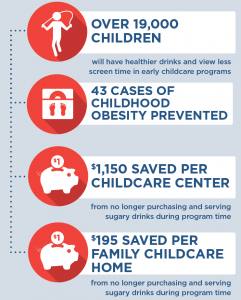The information in this brief is intended only to provide educational information.
This brief summarizes a CHOICES Learning Collaborative Partnership model for Best Practice Guidelines for Healthy Childcare in Detroit, MI. We assume a proportion of licensed programs would voluntarily adopt guidelines to eliminate sugary drinks and limit screen time. Participation rates are based on the number of programs voluntarily achieving 3+ star ratings from Great Start to Quality Program.1
The Issue
All children deserve the opportunity to be healthy. However, if current trends in childhood obesity continue, most of today’s children will have obesity at age 35.2 The health impacts and health care costs of treating obesity-related conditions in adulthood, such as heart disease and diabetes, cost $147 billion in 2008.3 However, research shows that avoiding sugary drinks and viewing less TV can help kids grow up at a healthy weight.
Early childcare programs are essential partners in supporting healthy habit development. Approximately 11,000 2-5 year-olds attend licensed childcare centers and family homes in Detroit.4 Providing training and technical assistance on guidelines to eliminate sugary drinks and limit non-educational screen time to 30 minutes per week would positively impact the children attending licensed childcare programs.
About the Best Practice Guidelines for Healthy Childcare Model
Best Practice Guidelines for Healthy Childcare would be put forth by the Detroit Health Department. The United Way provides professional development for early childcare professionals and would offer new voluntary training and technical assistance opportunities to early childcare providers. In turn, providers would implement the guidelines in their programs. The guidelines would encourage early childcare programs to not serve sugary drinks and to reduce non-educational television time to 30 minutes per week during program time. We estimate that 62% of centers and 30% of family childcare homes would voluntarily adopt the guidelines.1
Comparing Costs and Outcomes
CHOICES cost-effectiveness analysis compared the costs and outcomes over a 10-year time horizon (2017-2027) of implementing Best Practice Guidelines for Healthy Childcare vs. not implementing the guidelines.
Implementing Best Practice Guidelines for Healthy Childcare is an investment in the future and would save early childcare programs money. By the end of 2027, the model projects: |
Conclusions and Implications
Every child deserves a healthy start in life. This includes ensuring that all children in childcare have less exposure to beverages with added sugar and no nutritional value and have less exposure to screen time. Implementing Best Practice Guidelines for Healthy Childcare has the potential to reach 19,400 children ages 2-5 years in licensed childcare programs in Detroit. These children would consume fewer beverages with added sugar and view less screen time. In particular, children in family childcare homes would watch 2.3 fewer hours of screen time daily if the guidelines are met. This intervention would cost $107,000 to implement, though childcare program providers would save money when they are no longer serving sugary drinks. Overall, the CHOICES model estimates that there is a 97% chance that the intervention would be cost-saving. That is, it could save more due to the reduction in spending associated with serving sugary beverages than it may cost to implement.
The first few years of childhood can be an important time to promote healthy lifestyle behaviors. Implementing Best Practice Guidelines for Healthy Childcare could lay the foundation by ensuring that all children in childcare settings drink beverages that promote their health and have less exposure to screen time.
References
- Great Start to Quality Participation Data, July 1 2019. https://www.greatstarttoquality.org/great-start-quality-participation-data Accessed July 17 2019.
- Ward Z, Long M, Resch S, Giles C, Cradock A, Gortmaker S. Simulation of Growth Trajectories of Childhood Obesity into Adulthood. New England Journal of Medicine. 2017 Nov 30;377(22):2145-2153.
- Finkelstein EA, Trogdon JG, Cohen JW, Dietz W. Annual Medical Spending Attributable To Obesity: Payer-And Service-Specific Estimates. Health Affairs. 2009;28(5).
- Per previous estimates that 79% of children in day care are ages 2-5 years old out of the 0-5 year old population
Suggested Citation:Hill AB, Mozaffarian RS, Barrett JL, Cradock AL. Detroit: Best Practice Guidelines for Healthy Childcare [Issue Brief]. Detroit Health Department and United Way for Southeastern Michigan, Detroit, MI, and the CHOICES Learning Collaborative Partnership at the Harvard T.H. Chan School of Public Health, Boston, MA; December 2019. The design for this brief and its graphics were developed by Molly Garrone, MA and partners at Burness. |
This issue brief was developed at the Harvard T.H. Chan School of Public Health in collaboration with the Detroit Health Department through participation in the Childhood Obesity Intervention Cost-Effectiveness Study (CHOICES) Learning Collaborative Partnership. This brief is intended for educational use only. Funded by The JPB Foundation. Results are those of the authors and not the funders.
